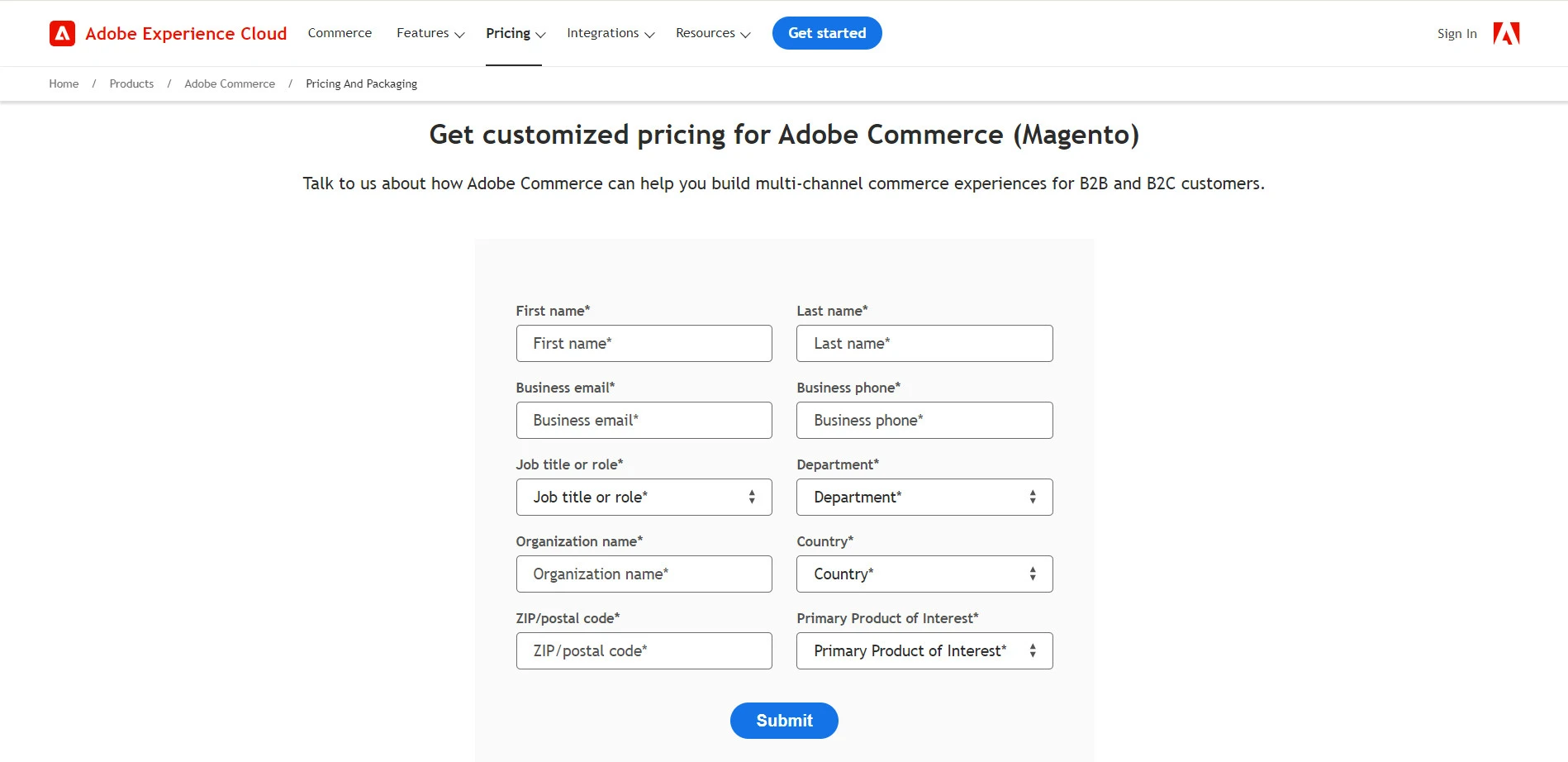Magento vs Salesforce Commerce Cloud are two of the most prominent eCommerce platforms available today. Both offer advanced capabilities to help businesses scale and succeed online, yet they follow fundamentally different models.
- Magento offers open-source flexibility and deep customization.
- Salesforce Commerce Cloud delivers a fully managed, cloud-native experience within the Salesforce ecosystem.
In this guide, we’ll compare Adobe Magento vs Salesforce Commerce across key dimensions, including:
- Pricing
- Hosting and deployment models
- Customization and flexibility
- AI and personalization features
- Marketing and merchandising tools
- eCommerce site management
- Omnichannel commerce and global scalability
- Integration and extensibility
- Security and compliance
- Support
Let's get in!
Magento vs Salesforce Commerce Cloud – A Quick Verdict
If you're short on time, here's the bottom line of the Magento vs Salesforce Commerce Cloud comparison. Neither platform is universally superior; the right choice depends entirely on your business size, budget, technical capabilities, and specific requirements. To help you quickly assess which direction to lean, we've distilled our comprehensive analysis into a clear comparison table and decision framework.
Category | Magento (Adobe Commerce) | Salesforce Commerce Cloud | Who Wins |
Pricing & Licensing | Tiered license based on Annual Gross Revenue; Open Source free but unsupported | Revenue share model (1–3% of GMV); includes hosting and support | Magento |
Hosting & Deployment | Self-hosted or Adobe-managed (PaaS); full infrastructure control | Fully managed SaaS; automatic scaling, no server access | Salesforce Commerce Cloud |
AI & Personalization | Adobe Sensei for recommendations, Live Search, content targeting via Adobe Target | Einstein AI + Copilot for real-time personalization and automation | Salesforce Commecre Cloud |
Customization & Flexibility | Full code access, open-source foundation, supports headless & PWA | Structured customization via SFRA; limited server-side control | Magento |
Marketing & Merchandising | Rule-based promotions, visual CMS, staging, SEO tools; extendable via Adobe stack | Built-in campaign manager, A/B testing, Einstein personalization, social tools | Salesforce Commecre Cloud |
eCommerce Site Management | Great admin controls, multi-site management, staging tools, MSI inventory | Business Manager UI, workflow automation, real-time analytics | Magento |
Omnichannel & Internationalization | Multi-store, multi-language, currency, POS/OMS integrations | Unified inventory, social commerce, in-store pickup, global rollout tools | Salesforce Commecre Cloud |
Security & Compliance | Merchant-managed security (Open Source); Adobe handles cloud compliance | Fully managed security, PCI DSS Level 1, automatic updates | Salesforce Commecre Cloud |
Customer Support & Community | Enterprise support via Adobe + strong open-source community | Unified support via Salesforce Success Plans + robust partner ecosystem | Magento |
Magento vs Salesforce Commerce Cloud Pro & Cons
When comparing Magento vs Salesforce Commerce Cloud, it's important to understand he strengths and limitations of each platform. Here's an honest assessment of what each solution does well, and where it falls short.
Magento | Salesforce | |
Pros |
|
|
Cons |
|
|
Explore more |
Pricing (Magento Wins)
Verdict:
When comparing Magento vs Salesforce Commerce Cloud in total cost of ownership, Magento wins. It offers more predictable pricing for businesses with stable revenue and internal dev teams. Salesforce Commerce Cloud simplifies infrastructure but may become more costly over time due to revenue sharing and ecosystem licensing.
Adobe Commerce follows a tiered licensing model based on your Annual Gross Revenue (AGR). Pricing may start at approximately $22,000 per year and increase with business scale and feature requirements. Optional Adobe Commerce Cloud includes managed cloud infrastructure (PaaS) with additional fees.
While Magento Open Source is free, it is not directly comparable to Salesforce Commerce Cloud due to its lack of enterprise support and hosting. Adobe Commerce is the appropriate counterpart in terms of scope and service level.
-
To have precise pricing for Magento Commerce, you’d need to leave your contact info for their Sales Rep
Like its open-source version, you still need to consider hidden costs, including ongoing maintenance, security updates, and the potential need for a dedicated development team.
Overall, Magento Open Source costs from $12K to $45K. If you plan to use Adobe Commerce Cloud, the cost may range from $22,000 per year to $125,000 per year.
Note: These figures are estimates and may vary depending on specific requirements, cloud hosting needs (Adobe Commerce Cloud vs self-hosted), and contract terms. Recommended reading: Magento (Adobe Commerce) Pricing.
On the other hand, Salesforce Commerce Cloud uses a GMV-based pricing model, where the platform cost is tied to a percentage of your annual gross merchandise value. This makes SFCC attractive for businesses that want predictable scaling costs as they grow, but it can become expensive at high volumes. This model can be advantageous for startups and smaller businesses, as it scales with revenue; however, it can become quite expensive for high-volume businesses.
For B2C Commerce:
- Starter Plan: 1% of GMV, designed for startups and smaller brands seeking entry into enterprise-grade commerce.
- Growth Plan: 2% of GMV, typically chosen by growing businesses with higher transaction volumes and evolving operational complexity.
B2B plans are custom-priced and often exceed B2C rates, given the additional features needed for account-based pricing, quoting workflows, purchase approvals, and large-volume orders.
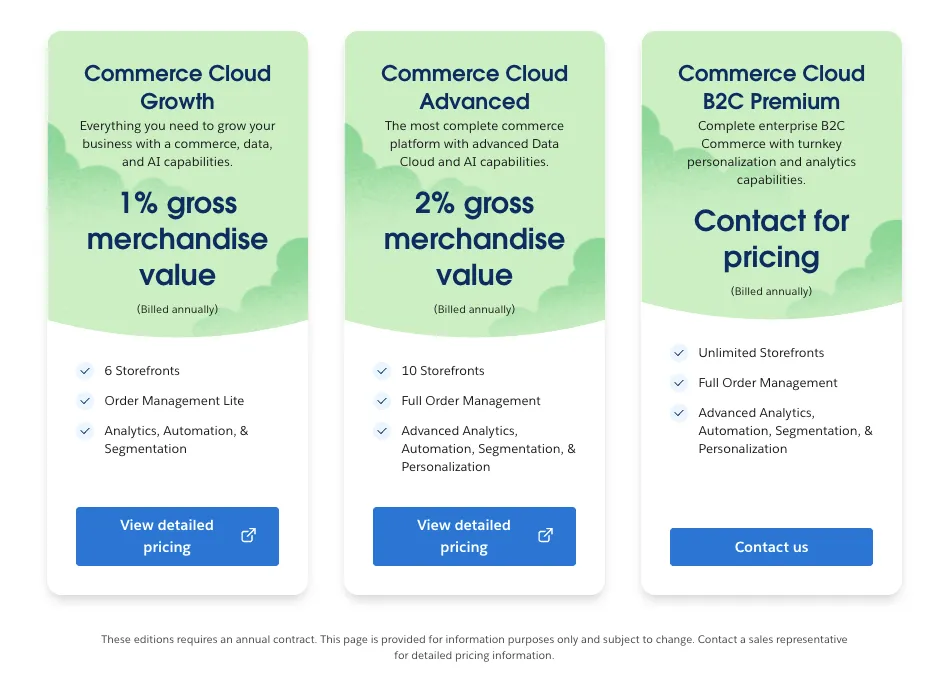
Note: Unlike Adobe Commerce, SFCC includes hosting, performance management, and updates in its base pricing, making it a more “hands-off” solution from an infrastructure perspective.
Compared the total cost of ownership of Magento vs Salesforce Commerce Cloud, the latter can cost you from $250K – $600K to build a full-fledged online store – much higher than Magento.
Hosting & Deployment (Salesforce Wins)
Verdict: Salesforce Commerce Cloud wins. Its fully managed SaaS model eliminates hosting responsibilities and scales automatically, while Magento requires infrastructure planning and maintenance unless hosted via Magento.
Magento (Adobe Commerce) offers flexible hosting options, depending on the edition and business needs:
- Self-hosted: Businesses can deploy Magento on their own infrastructure (e.g., AWS, Azure, on-premise), allowing for full control over environment configuration.
- Magento (PaaS): An optional managed hosting solution provided by Adobe, built on AWS. It includes DevOps tools, CI/CD pipelines, performance optimization, and infrastructure monitoring – while still retaining code-level flexibility.
Magento’s approach favors teams with technical resources that want a tailored environment but also offers managed services for those who prefer support with scalability and maintenance.
Meanwhile, Salesforce Commerce Cloud is a SaaS platform with fully managed hosting, which means:
- Hosting, infrastructure, and server maintenance are all handled by Salesforce.
- You don’t have to worry about patches, downtime, or scaling your infrastructure.
- Automatic scaling and updates ensure performance during traffic spikes (e.g., BFCM).
However, this also means less technical control. You’re bound by Salesforce’s ecosystem and architecture, which can be limiting for complex customizations or backend modifications.
AI & Personalization Capabilities (Salesforce Wins)
Verdict: Salesforce Commerce Cloud wins. Einstein AI and Copilot offer a more integrated, cross-platform AI experience, while Adobe Sensei focuses primarily on merchandising and product discovery within commerce.
Adobe Commerce integrates Adobe Sensei, Adobe’s proprietary AI engine, to enhance product discovery, merchandising, and search experiences. These features are natively available in the platform (not in Magento Open Source), and they integrate tightly with Adobe Experience Cloud for data-driven commerce.

Key AI features in Adobe Commerce:
- Product recommendations: Powered by shopper behavior and context to boost upsells and cross-sells.
- Live search: AI-enhanced site search with real-time indexing and autocomplete, personalized per user.
- Intelligent merchandising: Automated product ranking based on performance signals.
- Personalized content delivery: Through integration with Adobe Target and Experience Manager (optional).
These tools support both B2B and B2C use cases and are configurable through the admin interface with minimal development effort.
Salesforce Commerce Cloud includes Einstein AI, a native part of the Salesforce platform. It delivers real-time personalization and predictive analytics embedded across the customer journey.
Key capabilities include:
- Einstein product recommendations: Based on historical and real-time shopper behavior.
- Predictive sort: Automatically ranks PLPs per user.
- Search recommendations: Enhances query relevance with learning-based suggestions.
- Commerce Insights Dashboards: Help Merchandisers Optimize Decisions with Predictive Data.
Einstein AI also extends into Marketing Cloud and Service Cloud, enabling truly personalized, cross-channel engagement when SFCC is used within the broader Salesforce stack.
Customization & Flexibility (Magento Wins)
Verdict:
When comparing Magento vs Salesforce Commerce Cloud in terms of customization, Magento wins. It provides unmatched flexibility with open-source architecture and full code access, allowing complete customization of storefronts, workflows, and integrations – something SFCC can’t match.
Magento is built for flexibility. It provides full code access and a modular architecture, enabling businesses to customize every layer of their store—from storefront and checkout flows to backend logic and third-party integrations.
You can:
- Modify or replace core features
- Build custom modules and APIs
- Implement headless front-ends via PWA Studio or third-party frameworks
- Adapt workflows to unique B2B/B2C requirements
This makes Magento ideal for businesses with complex needs or niche functionality that off-the-shelf platforms can’t handle.
Salesforce Commerce Cloud, on the other hand, supports customization, but within a controlled, structured environment. The platform uses proprietary development frameworks like SFRA (Storefront Reference Architecture) and ISML scripting to extend functionality.
While customization is possible, it’s often constrained by the platform’s SaaS nature:
- Limited access to server-side logic
- Extensions must conform to Salesforce’s ecosystem
- Custom work typically requires SFCC-certified developers
That said, SFCC excels at providing pre-integrated, configurable tools for common enterprise use cases, minimizing the need for deep customization in many scenarios.
Seamlessly migrate your store to a more robust place!
LitExtension can safely transfer your products, customers, and orders to unlock more growth on the new platform.

Marketing & Merchandising Tools (Salesforce Wins)
Verdict:
Salesforce Commerce Cloud wins. It delivers stronger out-of-the-box campaign management, native A/B testing, and unified personalization across channels, reducing the need for third-party tools.
Magento includes robust marketing and merchandising features with a strong emphasis on control, segmentation, and campaign scheduling. You can manage promotions and customer experiences directly within the platform or extend capabilities through Magento Experience Cloud.
Key features:
- Visual Page Builder for promotional content and CMS control
- Rule-based promotions (cart price rules, customer group targeting)
- Content staging & scheduling for time-based campaigns
- Customer segmentation for tailored promotions
- SEO management tools for metadata, URLs, and structured data
- Integration with Magento Target & Campaign (optional) for advanced personalization and omnichannel marketing
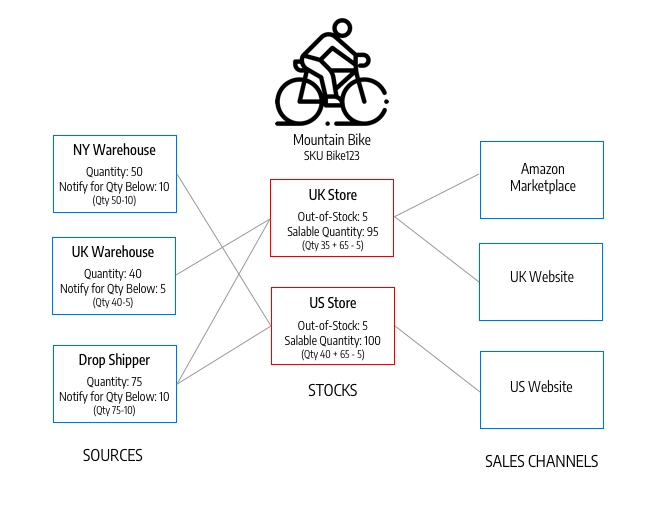
Merchandising includes dynamic product listings, custom sort rules, and related product automation.
On the flip side, SFCC integrates merchandising and marketing deeply into its core platform, with real-time personalization powered by Einstein and campaign execution supported via Salesforce Marketing Cloud.
Key features:
- Campaign management console to schedule promotions, banners, and experiences
- A/B testing and content targeting directly within the storefront
- Einstein recommendations for automated personalization
- Multi-channel marketing execution via native integration with Marketing Cloud
- Real-time analytics dashboards for merchandising optimization
- Dynamic content blocks personalized by segment, location, or behavior
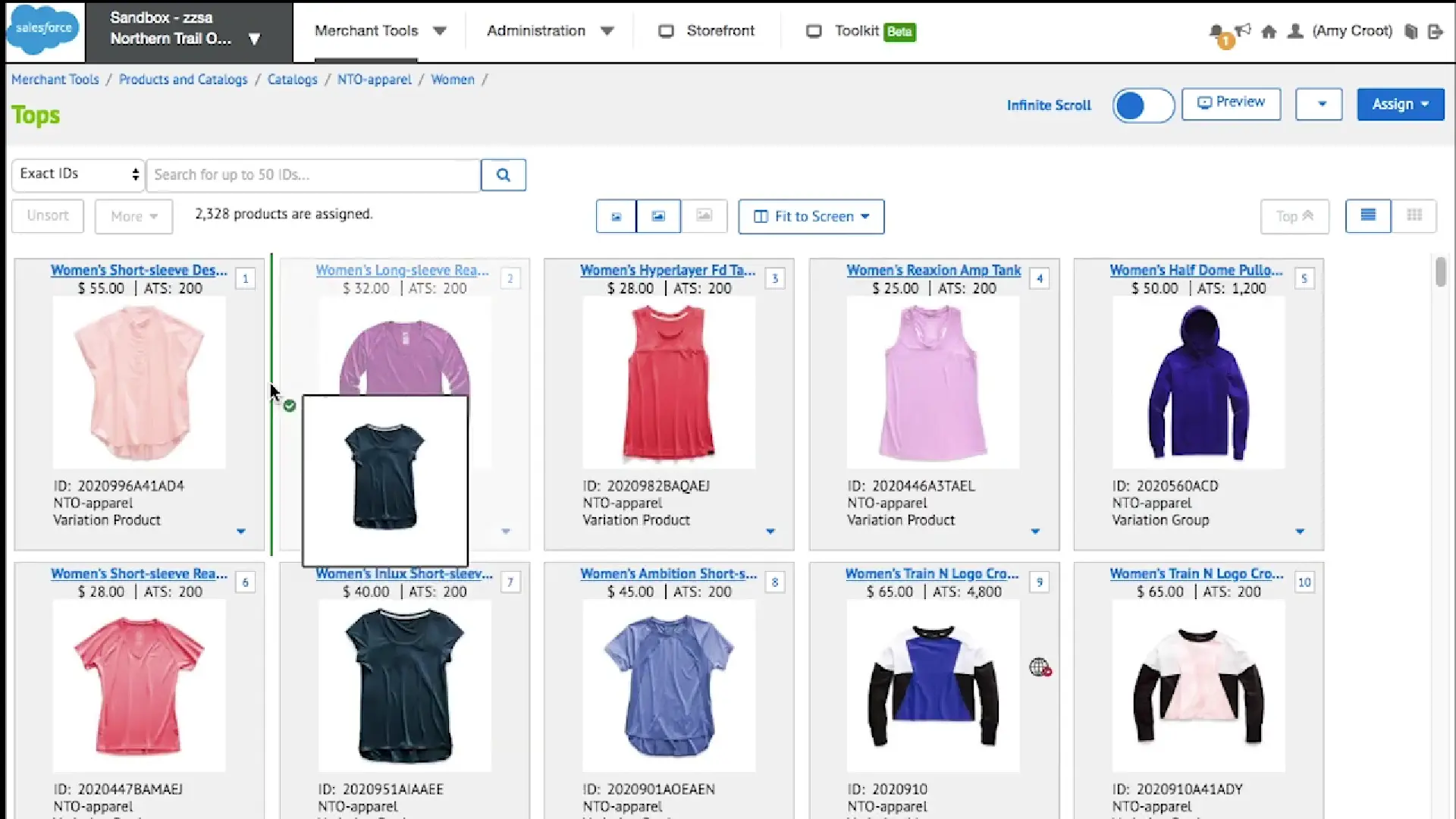
Merchandisers can manage categories, search rules, and product sequencing without developer involvement.
eCommerce Site Management (Magento Wins)
Verdict:
Magento (Adobe Commerce) wins. Its multi-store admin capabilities, staging tools, and customizable workflows offer deeper control for complex site structures and operational needs.
Magento offers a powerful admin interface designed for multi-store, multi-language operations. It gives full control over catalog management, order workflows, content updates, and user roles.
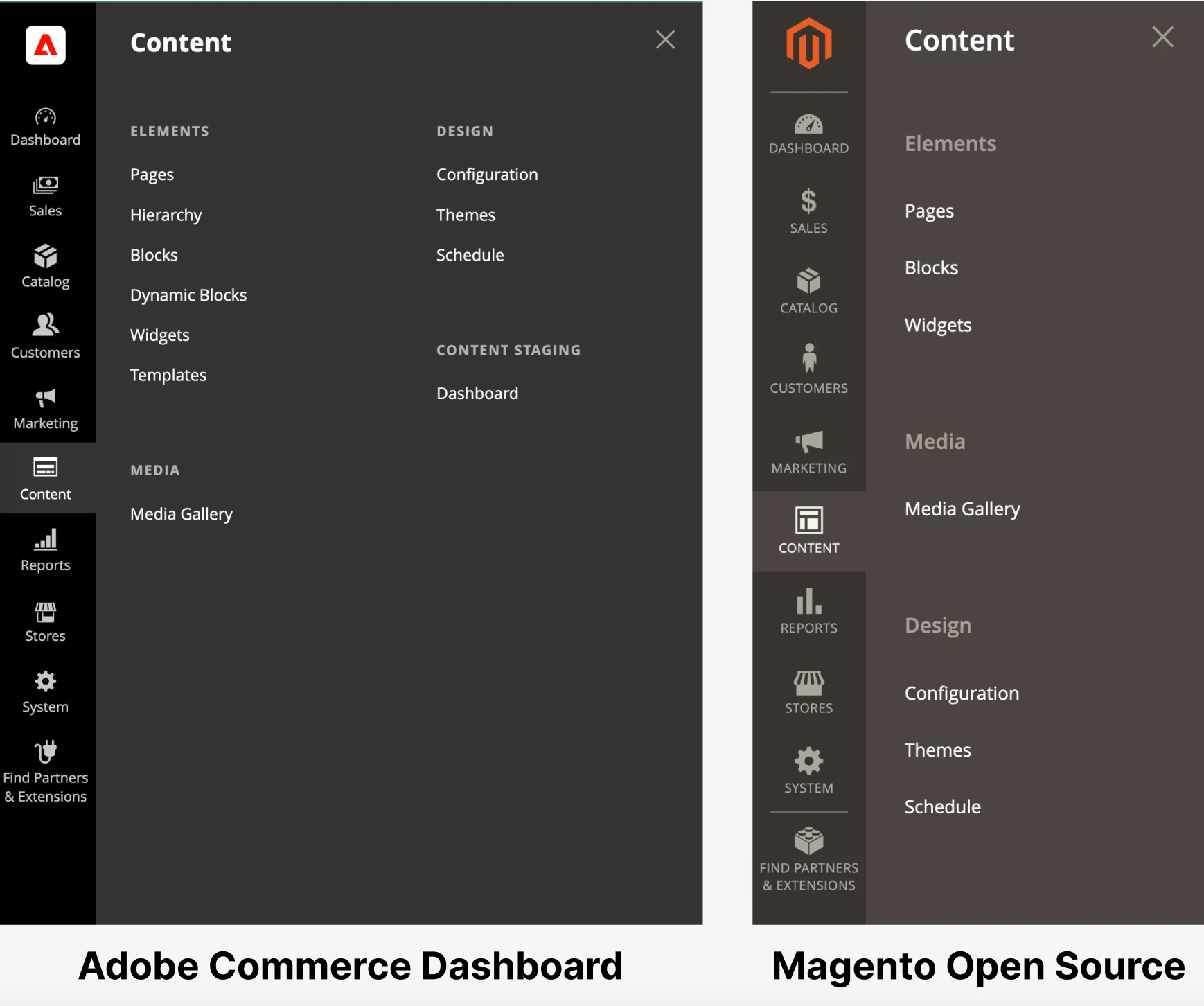
Key capabilities:
- Centralized admin for managing multiple storefronts across regions or brands
- Advanced user permissions to segment access by role or team
- Content staging & preview for scheduling site updates, launches, or promotions
- Multi-source inventory (MSI) for flexible stock allocation and fulfillment
- Bulk product updates and import/export tools for large catalogs
- Custom workflows for order, shipping, and approval processes via extensions
Adobe Commerce also supports headless setups and PWA front ends for performance and site flexibility.
When it comes to eCommerce features, SFCC focuses on operational efficiency with Business Manager, a centralized console tailored for non-technical users. It enables quick changes without developer input and supports global operations.
Key capabilities:
- Multi-site and multi-locale management with unified admin
- Real-time inventory sync and order orchestration
- Staging environments with sandbox support for pre-launch QA
- Workflow automation for product lifecycle and promotions
- Integrated analytics dashboards for live performance insights
- Business-user-friendly controls for promotions, content, and catalog changes
SFCC is designed to reduce time-to-market and enable teams to operate globally at scale with minimal overhead.
Omnichannel & Internationalization (Salesforce Wins)
Verdict:
Salesforce Commerce Cloud wins. It leads with real-time inventory syncing, social commerce integrations, and global infrastructure that supports seamless omnichannel execution.
Magento supports omnichannel and international commerce through its multi-store architecture. Merchants can manage multiple storefronts – across regions, languages, currencies, and customer segments – from a single admin.
Key capabilities:
- Magento multi-store, multi-website, multi-language support
- Localized pricing, taxation, and shipping rules by country or region
- B2B and B2C storefronts on the same backend
- Integration with POS, ERP, and OMS (e.g. Adobe Commerce Order Management)
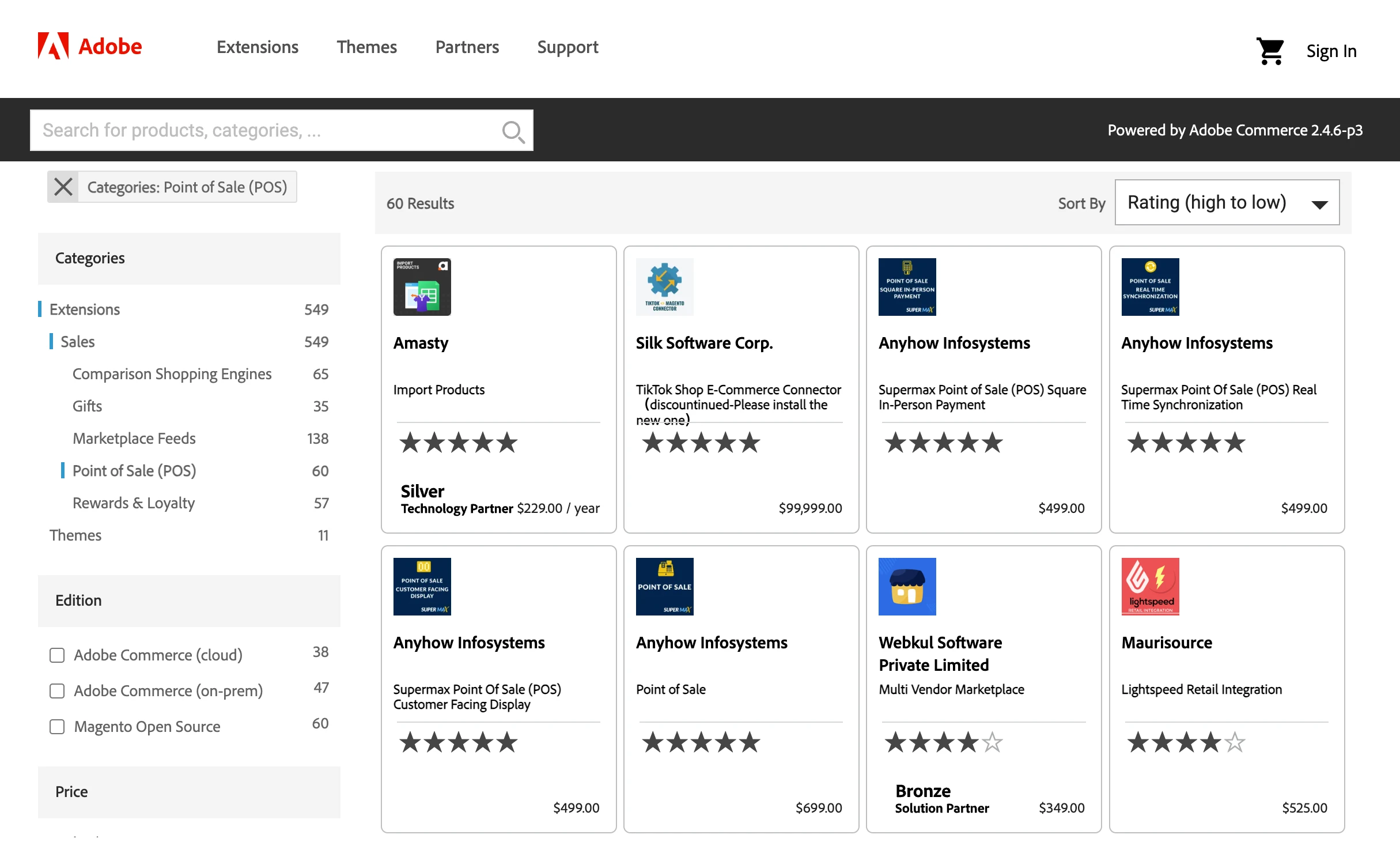
- PWA Studio and headless APIs for channel-agnostic storefronts
- Custom workflows for international catalogs and fulfillment
Adobe Commerce is ideal for brands managing multiple regional sites with varied customer experiences and operational rules.
On the other hand, Salesforce Commerce Cloud is built with omnichannel retail in mind. It natively supports global operations, unified commerce, and seamless customer experiences across digital and physical touchpoints.
Key capabilities:
- Endless Aisle and Click & Collect (BOPIS) integrations
- Multi-site, multi-currency, multi-language from a single instance
- Unified data model across eCommerce, CRM, and marketing
- Personalized experiences across web, mobile, in-store, and support channels
- Global inventory visibility and order routing
- Integrated with Marketing Cloud for geo-targeted engagement
SFCC is ideal for enterprise brands operating at scale across markets, regions, and sales channels with a focus on consistency and customer continuity.
Extensions and Plugins (Magento Wins)
The Verdict:
Magento offers more extensions and plugins. Though Salesforce Commerce Cloud’s AppExchange marketplace has many quality extensions, Magento’s extension and plugin marketplace is much more extensive.
Magento offers a vast marketplace with thousands of extensions and plugins. These cover a wide range of functionalities, from SEO and marketing tools to advanced analytics and payment gateways, allowing extensive customization of your store.
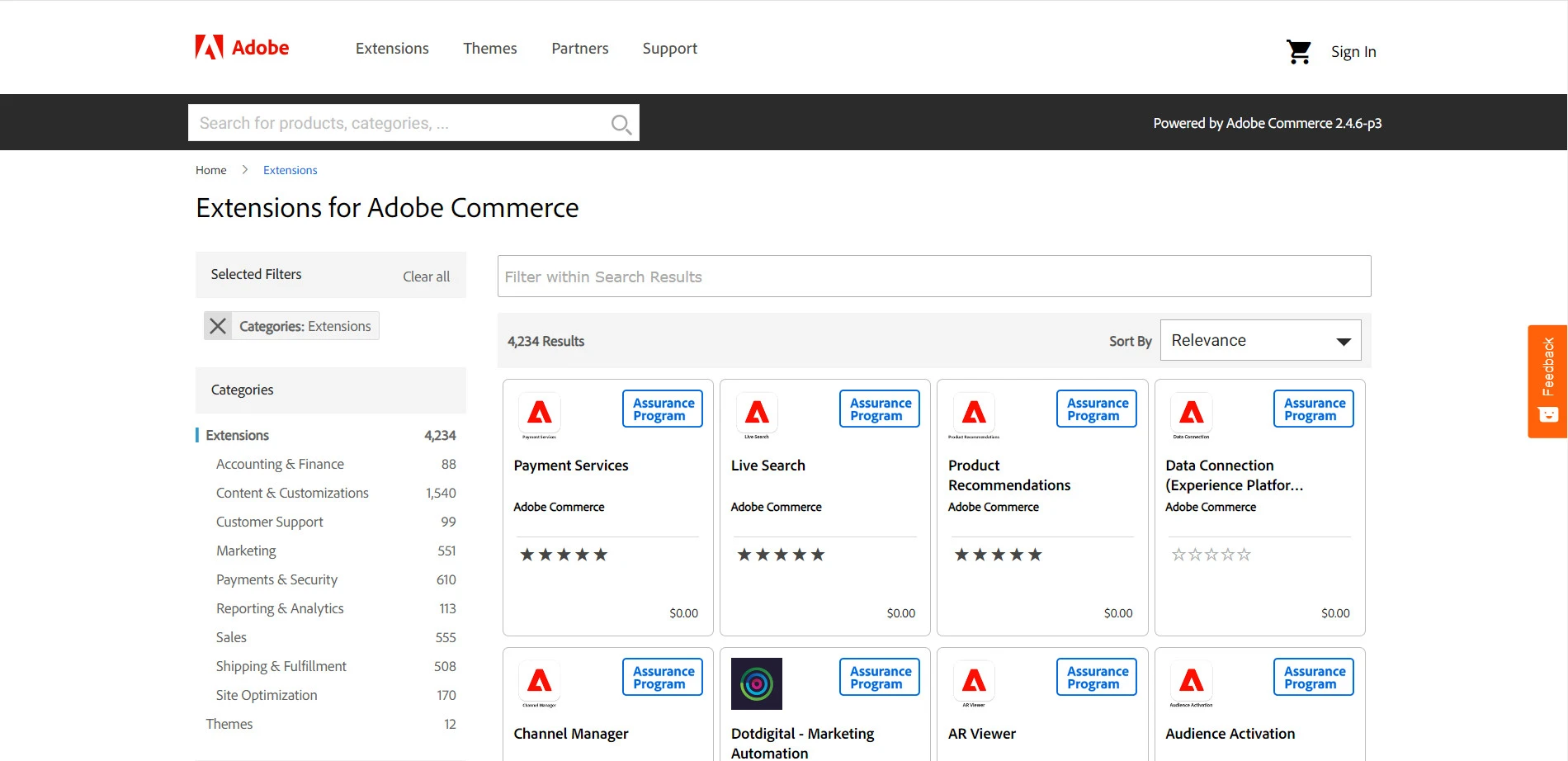
Salesforce Commerce Cloud provides several extensions through its AppExchange marketplace. While it offers numerous options for enhancing your store, the range and flexibility are much less extensive compared to Magento’s offerings.
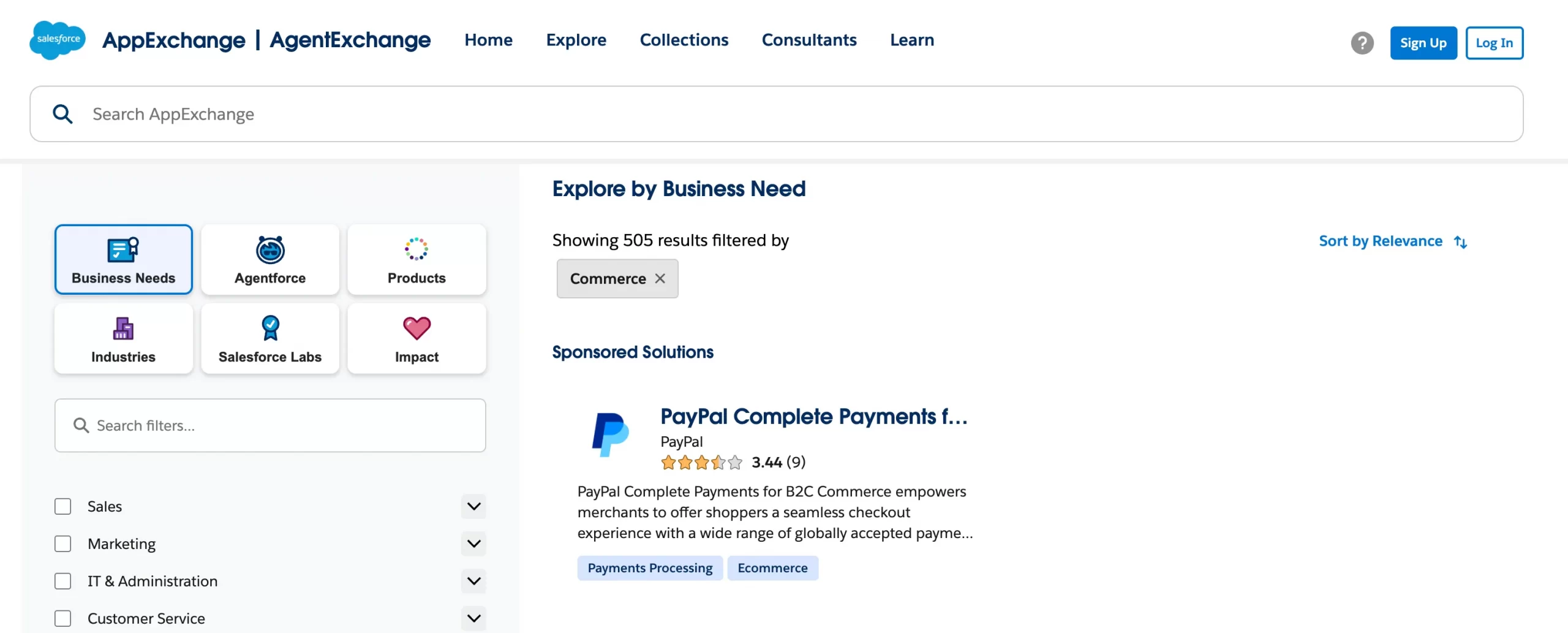
Security & Compliance (Salesforce Wins)
Verdict:
Between Magento vs Salesforce Commerce Cloud in the security realm, Salesforce Commerce Cloud wins. As a fully managed platform, it handles security patches, infrastructure hardening, and compliance certifications out of the box – reducing risk and overhead.
Magento provides robust security features, but responsibility varies depending on how the platform is hosted.
- For self-hosted deployments, security is the merchant’s responsibility. This includes patching, server configuration, SSL, firewall setup, and PCI compliance.
- With Magento Cloud (PaaS), Magento manages infrastructure-level security, including DDoS protection, WAF (Web Application Firewall), data encryption, and server hardening.
Magento regularly releases security patches and provides tools such as:
- Security Scan Tool for vulnerability monitoring
- Role-based access control for admin permissions
- Two-factor authentication (2FA) and CAPTCHA integrations
- Support for PCI DSS compliance, though merchants must still manage application-level requirements
Meanwhile, Salesforce Commerce Cloud offers fully managed, enterprise-grade security as part of its SaaS model. All infrastructure, data, and application layers are secured and maintained by Salesforce.
Key security features include:
- PCI DSS Level 1 compliance
- Data encryption at rest and in transit
- Multi-tenant isolation to safeguard customer data
- Automated patching and platform updates
- Regular SOC, ISO, and GDPR compliance certifications
Because SFCC is hosted and maintained by Salesforce, security is built into the platform by design, reducing the operational burden on the merchant.
Customer Support & Community (Magento Wins)
Verdict:
In terms of support and community between Magento vs Salesforce Commerce Cloud, Magento wins. While Salesforce provides strong enterprise support, Magento’s advantage lies in its combination of official support and a vast, active open-source developer community.
Support for Magento varies depending on the edition.
- Magento (licensed) customers receive enterprise-level support through Adobe, including SLAs, technical support tickets, onboarding resources, and performance monitoring.
- Magento users gain additional support for infrastructure, DevOps, and deployment.
- Magento Open Source, in contrast, has no official support from Adobe and relies entirely on the community.
Beyond Adobe’s services, Adobe Commerce benefits from a large global developer ecosystem, thousands of certified partners, and a mature marketplace of extensions.
You can find resources in
- Magento Help Center and Commerce DevDocs
- Certified Magento Solution Partners
- Magento Stack Exchange and forums
- Magento certification programs
Salesforce Commerce Cloud offers comprehensive enterprise support as part of its SaaS model. Support is tailored to the client’s service level and may include:
- 24/7 technical support with tiered SLAs
- Access to Salesforce Premier Success Plans (includes architectural guidance, enablement, and proactive services)
- Onboarding and solution architects during implementation
- Access to Salesforce Trailhead, a rich training platform for developers and admins
If you're using multiple Salesforce products (not just Commerce), you can manage them all through the same vendor relationship – including support, onboarding, and training.
Magento vs Salesforce Commerce Cloud: Which One Should You Choose?
Magento vs Salesforce Commerce Cloud offer distinct value propositions. The right platform depends on your organization's size, technical resources, existing systems, and operational priorities. Below is a practical recommendation based on core business criteria.
So, between Magento vs Salesforce Commerce Cloud, choose Magento if you:
- Require deep control over your eCommerce environment, including backend logic, front-end design, and data models.
- Have an in-house development team or agency partner capable of managing custom implementations.
- Demand a hybrid B2B/B2C setup, custom workflows, or advanced pricing structures.
- Want the flexibility to choose between on-premise hosting or Adobe’s PaaS cloud environment.
On the other hand, choose Salesforce Commerce Cloud if:
- You are a mid-market or enterprise brand with complex operations and high traffic volume.
- Your organization already uses Salesforce CRM, Marketing Cloud, or Service Cloud and benefits from integrated data and customer profiles.
- You prefer a fully managed SaaS solution with minimal infrastructure responsibilities.
- Your focus is on scalability, speed to market, and consistent customer experiences across channels.
- Your business operates internationally and requires built-in localization tools for multiple languages, currencies, and tax settings.
Magento vs Salesforce Commerce Cloud: FAQs
What is the main difference between Magento and Salesforce Commerce Cloud?
Magento (Adobe Commerce) is an open-source platform that offers full customization and hosting flexibility. Salesforce Commerce Cloud is a SaaS solution with built-in infrastructure and deep integration with the Salesforce ecosystem. Magento favors control; SFCC favors convenience and scale.
Does Salesforce integrate with Magento?
Yes. While Magento and Salesforce are separate platforms, integration is possible via APIs or third-party connectors (e.g., Magenest, Zapier, custom middleware) to sync customer, order, and product data with Salesforce CRM.
What is Magento called now?
Magento is now referred to as Adobe Commerce for the enterprise, paid version. The free, self-hosted version retains the Magento Open Source name. Adobe Commerce includes more advanced features, support, and optional cloud infrastructure.
What are the hidden costs in Magento and Salesforce Commerce Cloud?
Magento’s hidden costs include development and implementation, hosting infrastructure (unless using Adobe Commerce Cloud), ongoing updates, patches, and security and licensing for Adobe Commerce (AGR-based).
Salesforce Commerce Cloud’s hidden costs include revenue share fees (1–3% GMV), high implementation and onboarding via certified partners, and additional licenses for Salesforce products like Marketing Cloud, Service Cloud, etc.
Which is more scalable: Magento or Salesforce Commerce Cloud?
Both Magento and Salesforce Commerce Cloud scale well but differently. Magento offers technical scalability with infrastructure control. SFCC handles scaling automatically through its managed SaaS environment, which is better suited for rapid enterprise expansion.
Is Magento Open Source still relevant in 2025?
Yes, Magento Open Source remains widely used for businesses seeking cost-effective, customizable solutions. However, Adobe’s development focus and roadmap now lean heavily toward Adobe Commerce Cloud for enterprise clients. Open Source is still relevant but requires more self-management and technical investment.
Final Thoughts
In short, Magento vs Salesforce Commerce Cloud represent two fundamentally different eCommerce approaches.
Choose Magento (Adobe Commerce) if you need complete control over customization, have technical resources, or operate in complex B2B/B2C environments. Its open architecture and modular flexibility are ideal for businesses that prioritize ownership and scalability on their own terms.
Opt for Salesforce Commerce Cloud if you’re an enterprise brand seeking a fully managed, scalable platform with deep CRM integration and AI-driven personalization. SFCC simplifies operations and unifies marketing, sales, and service across channels.
We hope you found this article insightful and now have a clear understanding of the Adobe Magento vs Salesforce Commerce Cloud. For more content like this, be sure to visit the LitExtension blog to gain further insights and connect with fellow business owners.
